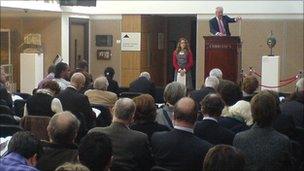Rare Roman helmet found in Cumbria auctioned for £2m
- Published
A bid by a Cumbrian museum to buy a rare Roman helmet and keep it in the county has failed after an anonymous phone bidder bought it for £2m.
The helmet was unearthed by a metal detector enthusiast in Crosby Garrett, near Kirkby Stephen, in May.
The piece, thought to have been worn by soldiers at sports events, was expected to fetch £300,000 when it went under the hammer at Christie's in London.
Carlisle's Tullie House was one of the bidders but was not successful.
Museum director Hilary Wade said: "We are of course disappointed that we haven't achieve it this time but we are going to battle on."
The museum's appeal attracted public donations of more than £100,000.
It included £50,000 from an anonymous businessman who pledged that amount if the public matched it.
Possible negotiations
The National Heritage Memorial Fund awarded the museum a £1m grant towards its bid.

Hilary Wade from Tullie House Museum, and Richard Speirs from Friends of Tullie House listen to the auction
However, the museum said it had not given up hopes of being able to keep the helmet in Cumbria.
Museum audience development manager Michelle Wiggins said it was too soon to say what their next step would be.
However, she said museum chiefs might look at the possibility of negotiating with the buyer to try to bring the helmet to the museum, at least on a short-term basis.
If the buyer plans to take the helmet overseas, they would need to apply for an export licence.
Applications can be referred to an expert adviser and if they believe the item is of national importance, it can be passed on to a reviewing committee.
If that body considers it meets criteria, it can recommend to the Secretary of State that an export licence is deferred to allow a matching offer to be made to keep the object in the UK.
'Discovery of a lifetime'

The helmet was expected to fetch £300,000
Tourism chiefs said they believed keeping the helmet in Cumbria would result in a £3m boost to the local economy.
They said they thought the helmet would have a "Mona Lisa" effect in drawing visitors to the region.
It is thought to be one of only three of its kind to be found in Britain.
It would have been worn, possibly with colourful streamers attached, as a mark of excellence by Roman soldiers at sport parades.
Christie's described the find as an "extraordinary example of Roman metalwork at its zenith" and "the discovery of a lifetime" for a metal detectorist.
- Published5 October 2010
- Published27 September 2010
- Published27 September 2010
- Published23 September 2010
- Published17 September 2010
- Published13 September 2010